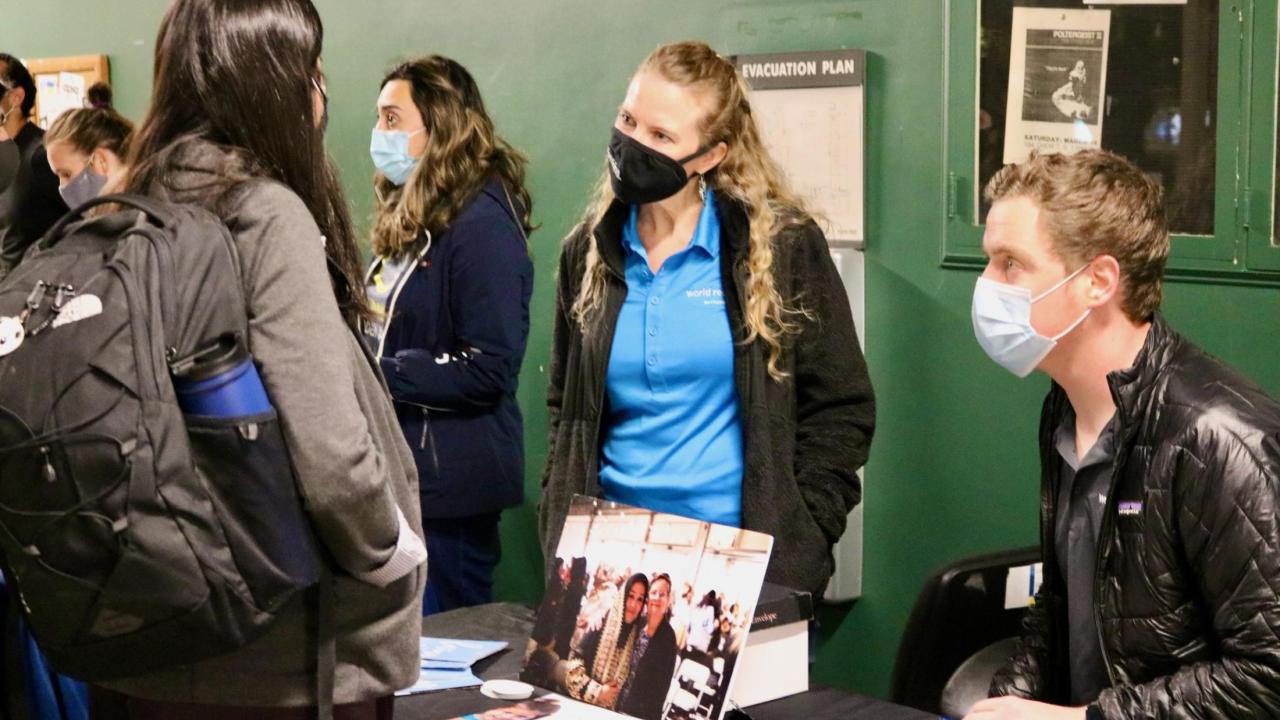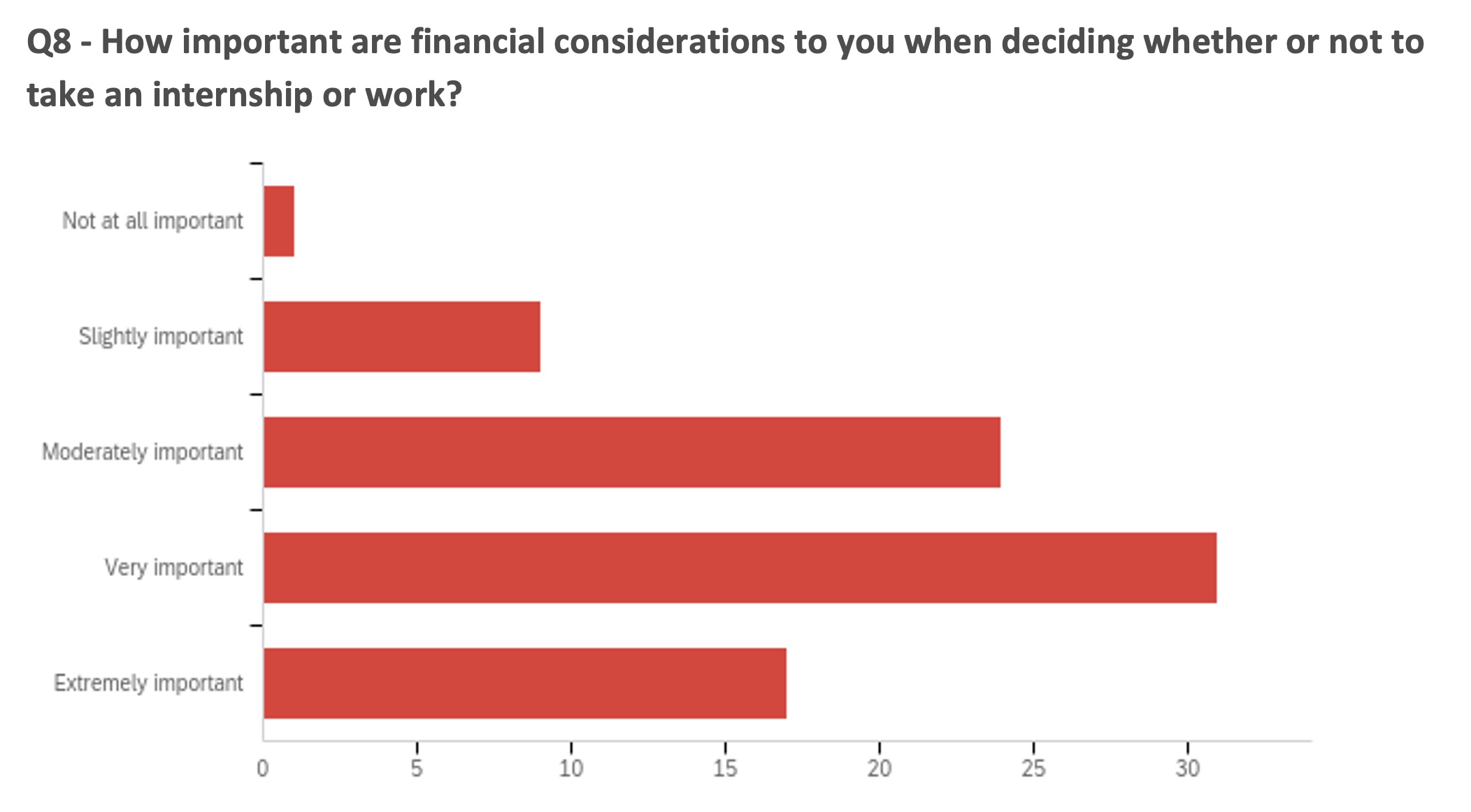
UC Davis Human Rights Lab: Human Rights Internships Impossible without Financial Assistance
Most students must choose between work and internships survey finds, hampering career opportunities
Quick Summary
- 75% of students believed that an internship was very important to their future career and ability to compete for employment. However, in terms of pursuing an internship, almost 60% of students shared that finances were a critical factor.
During Spring Quarter 2022, we polled students (n=90) in three Human Rights Studies classes (two upper division and one lower) about their interest in having a Human Rights related internship as well as the financial hurdles they experienced taking advantage of internships. The majority of Human Rights related internships are unpaid and typically ask interns to volunteer anywhere from 20-40 hours of their time per week.
The survey was developed and implemented by graduating senior Camille Pon, Human Rights Studies Program Undergraduate Assistant. It invited students to imagine three different kinds of internship opportunities: near UC Davis of their home; in New York City, home to the UN and major Human Rights NGOs including Human Rights Watch or Washington, DC; or Geneva, Switzerland, location of the UNHCR or The Hague, home ot the International Criminal Court. They were then asked to calculate how much financial assistance they would need to take advantage of the opportunity, rather than seek employment.
Key Survey findings:
- Over 75% of students believed that an internship was very important to their future career and ability to compete for employment
- Almost 60% of students shared that finances were a significant factor when deciding whether or not to take an internship
- Most students have access to housing support from their families as well as consistent transportation when interning locally
- Over 58% of students reported that they would not be able to take advantage of a local internship without additional financial support
- Over half of the students noted that a stipend of $4500 (or more) would be enough for them to choose the unpaid internship over a job
- Over 75% of students reported that they would not be able to take advantage of a domestic travel (NYC/DC) internship without additional financial support
- The majority of students noted that a stipend of $6000 (or more) would be enough for them to choose the unpaid internship over a job
- Over 75% of students reported that they would not be able to take advantage of an international internship without additional financial support
- To make this type of internship feasible, most students would need a stipend close to $7000

Comments from Students:
- I need to financially support myself with a paid job and do not have time to do an unpaid internship.
- I received an internship offer before, but was also offered paid work and I took the paid work experience despite the internship being more interesting to me for financial reasons.
- I was trying to get an investment bank internship, but the housing price[s] at where the company [is] located is too high, so I have to give it up.
- I only have money from summer jobs, so it would definitely not last long enough. My parents might be able to help, but it's not a guarantee.
- I think the financial aspect of an internship is the most difficult for me because I need a way to earn income since my parents aren't supporting my college career
- Normally over the summer, I try to work enough to make enough money that, should anything happen, I would have at least a few months of rent covered / whatever additional payments I make in a month (eg - car payments)
Interpretation
We polled students in Human Rights classes about their interest in having a human rights-related internship as well as the financial hurdles they experienced applying to such internships. The majority of human rights-related internships are unpaid and typically ask interns to volunteer anywhere from 20-40 hours of their time per week, which can be unsustainable without financial support. We gathered the following information to learn about how the UC Davis Human Rights Department can better support its students through a potential internship stipend.
In our survey, we found that over 75% of students believed that an internship was very important to their future career and ability to compete for employment. However, in terms of pursuing an internship, almost 60% of students shared that finances were a significant factor when deciding whether or not to take an internship. Most students have access to housing support from their families as well as consistent transportation when interning locally, but additional financial support is still needed, as over 58% of students reported that they would not be able to take advantage of a local internship without it.
In terms of the amount of financial support that students would need to pursue an internship, over half of the students noted that a stipend of $4500 (or more) would be enough for them to choose the unpaid internship instead of a job. A stipend is especially important for non-local internships, as more than 75% of students reported that they would not be able to take advantage of an internship involving domestic travel (NYC/DC) without additional financial support. The majority of students noted that a stipend of $6000 (or more) would be enough for them to choose the unpaid internship in place of a job, with over 75% of students reporting that they would not be able to take advantage of an international internship without additional financial support. To make this type of internship feasible, most students would need a stipend of close to $7000.
Personal testimonies from students that took the survey reflect these results. While students expressed interest in finding internships, the cost of housing and the reality that many internships are unpaid held them back. Multiple students shared that coming up with the money to support themselves in a full-time internship without being able to work would be difficult or unlikely, especially since they cannot rely on their families to support them. Many students have to financially support themselves and need to have money in case of an emergency, which means that working over the summer is their best option.
In addition, other students have stated that their lack of transportation have resulted in the decline of an internship opportunity. Though the city of Davis itself has an adequate public transportation system, it becomes more difficult once the opportunity is outside the city. Though Uber/Lyft are available, it can be very costly and its reliability can vary.
The authors conclude:
In our own experiences, we have been unable to do internships because of many of the reasons that other students have stated. The vast majority of human rights-related internships that we have found were in large, expensive cities and were unpaid. We would not have been able to receive financial support from our families to cover the costs of housing and living, and the hours of the internship would not permit having a job on the side. We have been unable to take advantage of internship opportunities, especially ones that were not local. A stipend geared specifically towards internships would have been extremely beneficial and would have most likely resulted in taking an internship rather than a job.
